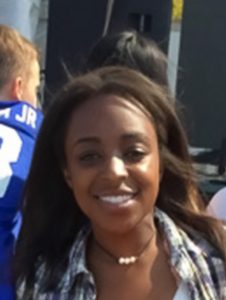
My major is Nutrition Science.
How did you get involved in research that you are currently doing?
I reached out to an academic advisor. I was on a three-year track, so I started in the fall of my second year (junior year) working on the Syracuse Lead Study data.
What grant allowed you to do this research?
As a McNair Scholar, I have support for purchasing/access to data programs.
Who was your research mentor? How did they help you in this process?
Dr. Lynn Brann was my mentor.
How did they help you in this process?
Dr. Lynn Brann was my mentor. I meet with her every week, and she gave me specific assignments, reviewed past work, and we problem solved any issues.
Why is this research important to you?
The Lead Study’s nutrition implications tie directly to my major. My focus is healthcare policy. Research is the beginning of policy so that helped this project come full circle for me. It made me passionate about my project because it’s related to kids, their diet, and how that affects health outcomes.
Approximately how many hours did you spend on research each week?
About eight hours a week between independent work and meetings.
What was the most challenging aspect of your research, or an aspect you didn’t enjoy?
I know research isn’t linear and things are going to present challenges, but it was weird for me to agree on something with my professor, for example, how we will organize carbohydrates and then the next week change it.
What is the biggest thing you have learned during this process?
Things don’t go exactly how you want them to every single time. I always knew that about research, but actually doing it and sometimes taking two steps back to get one step forward was frustrating. So, I learned the importance of patience.
How do you think the research you conducted as a student will impact you in the future?
In my research project, it’s all about taking thousands of data points and bringing it down to a couple of main ideas. That’s something as a physician I’ll need to do with patients. The undergraduate experience gets you used to data organization, which is a skill I will need in medical school.
